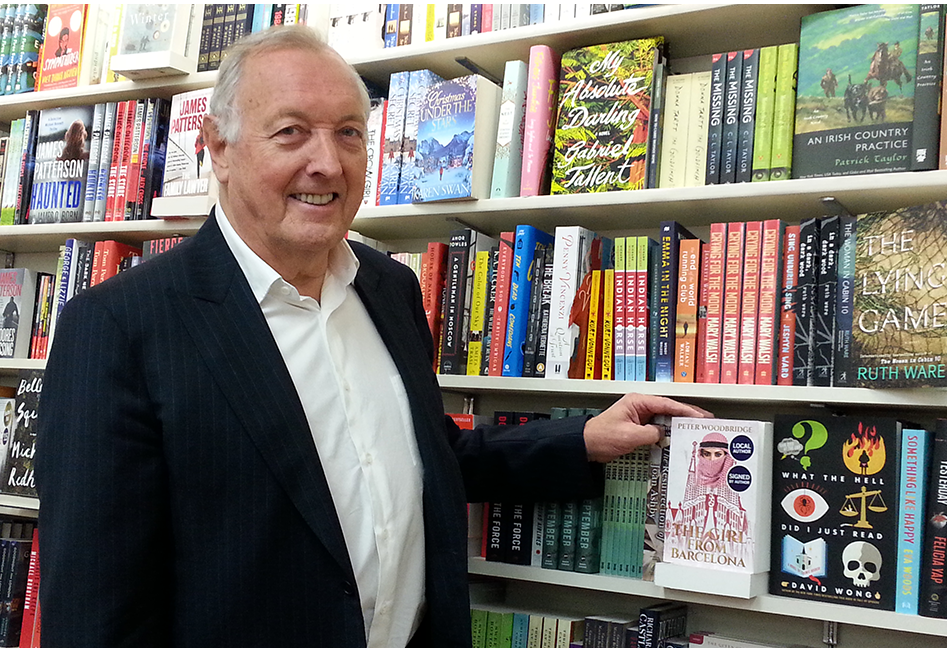Biography
Occupation |
Novelist |
Genre |
Thriller, Mystery, Crime Fiction |
Hobbies |
Hiking, Travel, Rugby (until his body begged him to stop) |
Born in England, Peter Woodbridge left school at age 15 and began work as a booking clerk for British Rail, where he developed a love for steam engines.
Continuing his studies through night school, Peter won two scholarships that led him to a B. Sc. in Agricultural Economics from the University of Reading, followed by an M. Sc. in Business Administration from the University of Bradford.
He began his professional career as an agricultural industries analyst, ultimately providing policy and planning advice to senior levels of industry and government in North America, Asia and Europe. This took him to far-flung locations including tea estates in Uganda, cotton plantations in Ethiopia and tropical hardwood forests in the South Pacific—eventually settling in Canada, where his consulting practice produced numerous leading-edge strategic analyses for the global forest products industry.
Now retired from his consulting practice, Peter has returned to his first love—writing. The Girl From Barcelona is his first published novel.
Interests
Outside of writing, Peter loves hiking in the mountains of British Columbia and Arizona, the relaxed lifestyle in Barcelona and travelling. He played rugby throughout his school days, later representing his university, eventually lapsing into social rugby in adult recreation leagues until his body begged him to stop.
An avid fan of English and European football, he sinks into abject misery every time his beloved Reading FC is beaten by lesser teams… which is often. It drives him back to writing.

Q+A
From time to time, I get to engage with readers at a book signing or similar event. They are generous in sharing their own stories and their enthusiasm is infectious. I’m often touched by the support they show for the literary arts—especially, it seems, for local authors. Every conversation is personal and unique. But through all the interactions, some common questions arise. These are the questions I’m frequently asked, and here are my answers.
Q:
Why did you write a trilogy for The Girl From Barcelona?There were a few reasons. Daniela’s story takes place over a period of several years. It has a historical backdrop which takes place in the context of actual events in Spain and elsewhere. The October 2017 Catalan Independence Referendum is an example. This wasn’t just a single event. To give realism to the plot, I wanted some of the principal characters, all of whom are fictional, to participate in the progression of these events. So, the chronology of the story tilted to separate volumes.
There are practical advantages too. To ensure that printed copies are reader-friendly and easy to hold, my marketing colleagues at Bearwood Publishing and I designed each volume to be around 105,000 words. That might be helpful production information for other indie authors.
Q:
Will there be other Daniela stories beyond the trilogy?Quite possibly—although that will depend on continued reader feedback. So far, I’ve found that several characters are consistently popular favourites. People want to know what happens to them. We will be announcing some new titles, so please subscribe to my newsletter and social media platforms, and stay tuned. There are more great reads on the way.
Q:
Many scenes from the trilogy are set in Syria and other parts of the Middle East. Is this a suitable book for readers in that region, particularly because of the ongoing political conflicts, violent jihadism and the Syrian Civil War?In part, that’s why I wrote this story. It took a lot of research. I also spent of lot of time travelling (before Covid) to validate the authenticity of the places I’ve written about. I’ve tried to reflect a balanced historical context. Importantly, too, many principal and support characters tell the story from their perspectives, which are not a Western point-of-view.
Q:
Are you considering translations of The Girl From Barcelona series?Yes. We are actively exploring options to have the trilogy translated into Spanish.
Q:
Are you active on social media?Q:
When did you first begin writing stories?I started writing as a teenager. Then, after a late start at university, my company sent me to work overseas; on a cotton plantation in the Danakil Desert in Ethiopia. What an inspiring experience! There were so many stories to be told. But it was also a time of great famine; terrible human suffering. No one in my generation wanted to write about it, we wanted to do something about it. So, I left writing aside for a time. I went back to short stories later and, more recently, started to write novels.
Q:
What drove you to write The Girl from Barcelona?I’ve always been fascinated by the history and contradictions of Spain. As a young man, my uncle in England had wanted to fight for the International Brigade during the Spanish Civil War, but my dad talked him out of it. That family history left a big impression on me. Years later, I’ve had time and the opportunity to begin to understand the various layers of Spanish society and its politics. As much as Spain has evolved to a democracy, its society still has almost as many contradictions as it had generations ago. That’s fascinating in modern Europe; it’s a time warp.
Q:
What do you love most about The Girl from Barcelona?I like the conflicts it sets up between the characters. Some are major clashes: strong personalities and differences in values which determine their actions. Other conflicts are niggling frustrations that don’t seem to have any resolution—until something surprising happens. For example, some of the relationships that are key to Daniela’s life and her deceptions are not always what they appear. And, as brilliant as Tony is as a detective, he’s really dumb when it comes to understanding women, which probably is something many readers can relate to. The people and the events are fiction, but they highlight the contradictions of modern-day Spain. Whether you sympathize, or hate, or love the characters, you get drawn in. You want to know what’s going to happen to them.
Q:
Have you been published before?I’ve written regularly for business magazines and newspapers, as part of my business career—and some public studies and reports. The Girl from Barcelona is my first published work of fiction.
Q:
Is it difficult to make the transition from factual business writing to writing fiction?No, in some ways, it’s very similar: you have to capture your readers and make your message interesting for them. The attraction of writing a novel is you have the chance to ‘release’ the characters behind the story—even though, as the author, you’re really only there to provide a platform for them to live their lives, within the context of the plot. And a good story can be timeless and have its own energy and momentum. That’s hard to achieve in a business report.
Q:
Do you ever work on more than one novel at a time?It’s hard not to. There are so many compelling stories, just waiting to be written. It comes down to self-discipline. You have to dedicate yourself to writing just one story—and making it the best you can do. All the other stories you want to write have to wait. Actually, that’s not quite true, because sometimes you just have to sneak back to the other stories, and add to them, because they’re always there—and things are happening.
Q:
How do you get your ideas for a story, or a character?The story idea usually starts off with a very simple thought. That can happen anywhere, anytime. It’s just a flash of an idea. If I can’t let it go, the story evolves from there. So do the characters, in the same way. The story develops an energy and a life of its own. It doesn’t need to be written down—not right away, at least. It just percolates, and eventually I sit down and write it. Then it becomes a passion to fine-tune and complete it.
